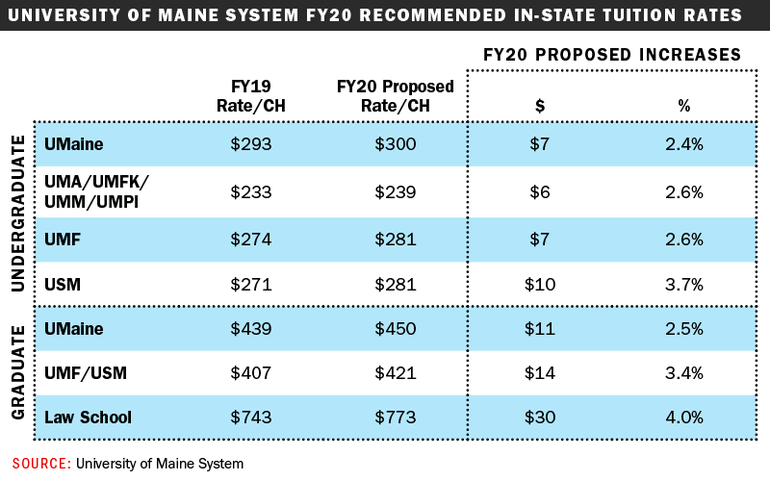UMaine trustees OK tuition increase, $6.6M boost in grant and scholarship aid

The University of Maine System's trustees unanimously adopted a spending plan for fiscal year 2020 that includes a 2.5% inflation-based adjustment to in-state tuition based on the consumer price index.
The increase means that the undergraduate cost-per-credit hour for Maine students will increase between $6 and $10 per credit hour at the seven UMaine campuses in the upcoming academic year.
Also included in the FY2020 spending plan is a $6.6 million increase in grant and scholarship funding, a 7.6% increase over this year, to help students meet their academic costs. Over the last five years the universities have increased gift aid to $93.2 million, a $26.6 million, or 40%, increase while holding the line on tuition.
In April, the UMaine System announced that one-in-four Maine undergraduate students — or 4,077 degree-seeking students — were enrolled in the spring semester free of tuition and fee expenses as a result of the grant and scholarship aid provided through financial aid awards.
“Our financial aid investments are lowering the cost of attendance for Maine students and their families,” said Trevor Hustus of Hollis, the student trustee to the UMaine System’s board. “Reducing the reliance on loans helps ensure that student debt does not prevent students from staying in Maine after graduation and starting a career in their hometown.”
Highlights of adopted budget
Other features of the adopted budget:
Early college and adult learner expansions: The FY20 budget projects an additional increase in early college credit hours of 12% over the upcoming year and 6,500 in additional credit hours production linked to soon-to-be-launched, fully-online nursing, education, business and adult completion programs. Marketing for these online programs will begin later this month.
Expanding access to Maine high school students and delivering academic programming that career-focused adults can balance with work and family commitments are strategic priorities for the system. Gov. Janet Mills proposed an additional $3.1 million in state support for early college and $4.1 million for adult degree completion initiatives in her biennial budget proposal.
$3.4 million approved for space reduction investments: The board approved spending up to $3.4 million from the Trustees Strategic Investment Fund over the next two fiscal years for reducing expenses by demolishing unneeded university facilities statewide. Current planning has identified a group of 27 demolition projects totaling 181,000 gross square feet of underutilized space. Reducing occupied space produces an operational savings of $7 per square foot.
“Reducing inefficient, underutilized space has a positive impact on our operating costs and advances the Board’s commitment to providing affordable access to public higher education,” said Ryan Low, Vice Chancellor of Finance and Administration. “We are on a path to decreasing the university footprint by approximately 350,000 square feet over ten years, reducing costs by nearly $2.5 million for our students and taxpayers.”
Funding approved by the board this week will contribute to plans at the University of Southern Maine to demolish the Dickey Woods residence hall on the Gorham campus. USM will be removing the vacant space as part of a multi-year implementation of a master plan that will build a new career and student success center and student housing on the Portland campus.
USM also plans millions of dollars in investment at the Gorham campus with ongoing capital investments, proceeds from the University workforce bonds, and public private partnerships that will invest in dining hall facilities and energy inefficiencies.
Page Scholarship Fund: The board announced a tribute gift program to establish a system-wide scholarship celebrating the leadership of outgoing University of Maine System Chancellor James H. Page, who announced in December he would be retiring at the end of the academic year.
Proceeds from the Page Scholarship Fund will prioritize awards for adult Maine learners in keeping with the advancements in access for career-focused students achieved as part of Chancellor’s One University initiative. Contributions to the fund can be made by visiting our.umaine.edu/pagefund.
New trustees and election of officers
Former 2nd District U.S. Rep. Michael Michaud of East Millinocket and Sven Bartholomew of Brewer were nominated to the board of trustees by Gov. Janet Mills. The nominations were approved by the Legislature and the new members attended their first meeting of the board this week. Michaud will also be serving on the Maine Community College System Board.
The board unanimously approved the continued service of trustee James Erwin of Yarmouth as board chair and trustee Kelly Martin of Fort Kent as board vice chair for 2019-2020.
The board adopted a resolution of appreciation for trustee Samuel Collins’ nine years of service and leadership on the board of trustees. Collins served for four years as board chair, two years as vice board chair, and led two chancellor search committees and the search for the UMPI president.
John Short, who is retiring as president of the University of Maine at Fort Kent was recognized by the board for his service in Maine. Short helped strengthen a state-leading nursing program at UMFK that has seen enrollment grow 53% over five years and will be launching a new, fully online RN-to-BSN Nursing program in the fall semester. Short was also recognized for the leadership he's show in growing the early college programming at the institution.













0 Comments